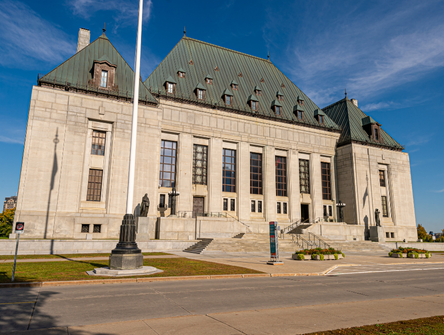Challenging Quebec's tuition plan
It would be an uphill battle, and not only because it would rely on novel legal arguments.

These are heady days in Canada for experts in constitutional law and intergovernmental relations — which tends to mean anxious times for just about everyone else.
Given the recent phenomenon of premiers threatening to defy federal laws they don’t like and pre-empting Charter challenges by invoking the notwithstanding clause, it might be easy to overlook the overhaul of university financing in Quebec announced by Premier François Legault’s government just before the holidays.
The government has told the province’s three English universities that their tuition rates for out-of-province students will increase by a third in the fall, and they’ll face financial penalties if they don’t bring 80% of their out-of-province students up to an intermediate level of French by fall 2025.
The Legault government defends the policy as necessary to protect the French language in Quebec. The universities say it will gut their enrollment and put them on thin ice financially; Deep Saini, McGill’s principal and vice-chancellor, called the policy “catastrophic” and a “targeted attack” on English universities. He’s not ruling out a lawsuit.
Advocates for the anglophone community in Quebec see Legault’s university policy as part of a populist trend at the provincial level undermining constitutional guarantees of minority rights in Canada. They also believe the policy is vulnerable to a court challenge. But there’s no clear consensus on the form of such a challenge.
“It is essential to Canada — to the existence of Canada — to protect the rights of linguistic minorities to live their languages and cultures wherever they are in the country,” says Ronald Caza, a specialist in constitutional and human rights law at Caza Saikaley in Ottawa. “To do that, they need institutions like McGill. Governments cannot be imposing policies that put those essential institutions at risk.”
The obvious path to a court challenge would be through the Charter of Rights. A claim under section 15 would argue that the university policy violates the right of anglophones to be protected from persecution based on “national or ethnic origin.”
“Canadian students coming from outside Quebec to study are being hit with a double whammy,” says Michael Bergman, a Montreal-based lawyer who has represented linguistic minority groups in both Ontario and Quebec.
“It’s harder to learn a new language once you’re in your 20s, but if these students need the grades for graduate school, they have a serious problem. They’re not being treated like everyone else.”
A second option, says Bergman, would be to go after the policy through section 6 of the Charter, which shields mobility rights. The argument, he said, would be that Quebec is imposing a financial penalty to discourage out-of-province students.
“[The policy] imposes a special premium — let’s just call it a tax — on out-of-province Canadians attending English universities in Quebec,” he said. “The tax is meant to be a disincentive.”
Julius Grey of Grey Casgrain, a Montreal lawyer and expert in constitutional law, acknowledges that any Charter challenge would invite the Legault government to invoke the notwithstanding clause. Such an action would itself be vulnerable to a shift in public opinion, he says.
“This is identity politics,” Grey says. “There’s no magic bullet. But the judiciary exists within society, so changes in public opinion, in the political context, do matter.”
Caza argues there are other options. One, which he acknowledges would be “novel,” would see the policy challenged under section 23 of the Charter, which protects the right of Canadians to receive education in the official language of their choice.
“A section 23 argument would be novel because post-secondary education is not operated by the provinces,” he says. “The issue has not yet been determined, but a strong argument could be made [that] the essential role played today by post-secondary institutions for linguistic minorities is the same as that played by primary and secondary school institutions.”
Another option, he says, would be to reach back to the Supreme Court’s 1998 reference on Quebec sovereignty, drafted at the federal government’s request following the near-miss referendum result of 1995.
In it, the high court affirmed the existence of “foundational” and unwritten constitutional principles that predate the Charter — among them, the protection of minorities.
“… It should not be forgotten that the protection of minority rights had a long history before the enactment of the Charter,” the court wrote at the time. “Indeed, the protection of minority rights was clearly an essential consideration in the design of our constitutional structure even at the time of Confederation.”
“The notwithstanding clause cannot be applied to section 23 of the Charter and to constitutional principles,” says Caza.
But Benoit Pelletier — former minister of intergovernmental affairs in the government of Premier Jean Charest, now a professor of law at the University of Ottawa — says an appeal to fundamental constitutional principles beyond the Charter is very unlikely to fly with the high court.
“Those underlying, unwritten principles exist in part to help the courts create structural doctrines that are necessary to the coherence of the constitutional architecture,” he says. “In that sense, it’s there to fill the gaps in the written document.
“But I can see no gaps to be filled here. The right to education in English extends to primary and secondary education. It does not apply to post-secondary. The argument amounts to a request for a new constitutional right, and I think that would be a very hard argument to make successfully. These underlying principles have limits.
“All provinces have the right to set tuition fees. No one has denied the right of provinces to do that.”
At this point, there doesn’t appear to be a singular, obvious legal strategy to challenge the Legault government’s university policy. That doesn’t mean its opponents should stand down, says Caza.
“Linguistic minorities can’t afford to be complacent. They have to assume the worst — that they’re being targeted because that is the government’s true intent,” he says.
“In my experience, the sooner you challenge these things in court, the sooner you find out how far a government is really willing to go.”


